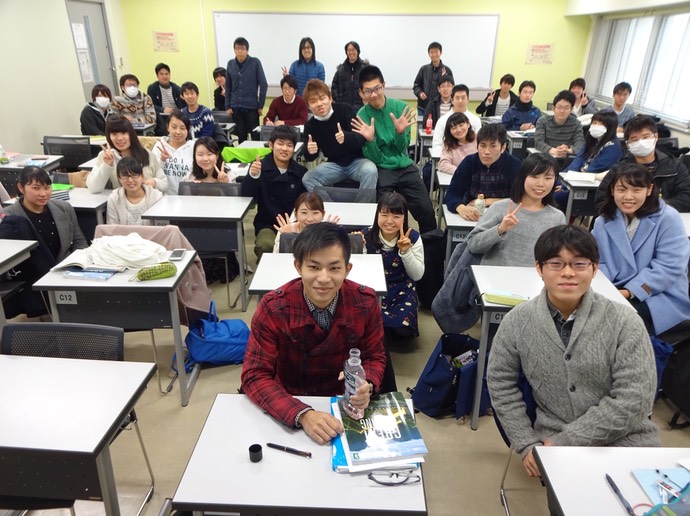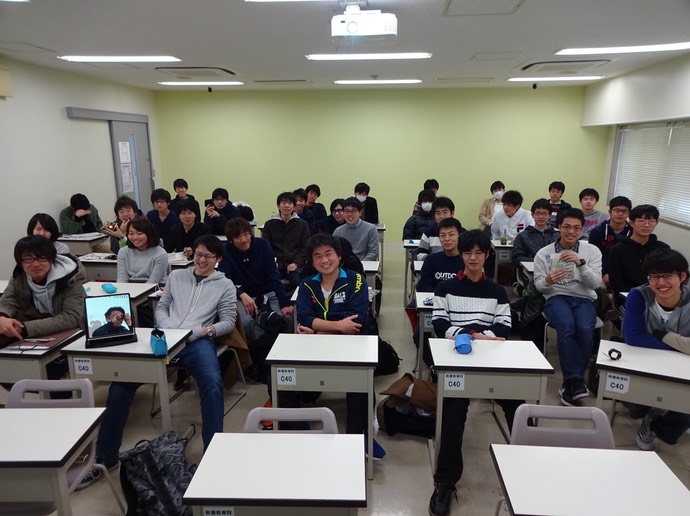- 火曜・4限・英語中級(AEI)・工学部(化生・マテリアル・電機・土木)
- 水曜・3限・英語中級(AEI)・理学部


【資料】Materials (in the order they were introduced)
- Instruction for Essay 2 (Take-home classification essay)
- Tatem, A. J., Guerra, C. A., Atkinson, P. M., & Hay, S. I. (2004). Momentous sprint at the 2156 Olympics? Nature, A31, 525.
- Instruction for Essay 3 (Take-home cause-effect essay)
【本授業の目的およびねらい】
本授業は、学術的な英文に関する基礎的なリーディング能力とライティング能力の養成を目的とする。そのねらいは、研究拠点大学である名古屋大学の学生にふさわしい学術英語を使いこなす能力を身につけるところにある。論理的な英文のカギとなるエッセイの構造に着目し、目的に応じて必要な情報をいかに読みとるか、また逆に、自分の考えをその根拠とともにいかに説得力ある論理的な英文に組み立てるかを学ぶ。将来、専門の論文を英語で読んだり書いたりする時に、指針となる英文構成法の基礎、および実際に役立つ英語表現を多く習得する。
【履修条件あるいは関連する科目等】
Please refer to the guidelines on the undergraduate English studies.
【授業内容】
While the course consists of both reading and writing components, weekly classes will primarily focus on the latter. Folse et al. (2014) textbook will be used as follows:
Week 1: What is Academic English Intermediate? (工学部 10/3) (理学部 10/4)
Week 2: Introduction to paragraphs (Unit 1) (工学部 10/10) (理学部 10/11)
Week 3: Five elements of good writing (Unit 2) (工学部 10/17) (理学部 10/18)
Week 4: Five elements of good writing (Unit 2) & APA style (工学部 10/24) (理学部 10/25)Homework
Week 5: Types of paragraphs (Unit 3), Brainstorming and essay writing (工学部 10/31) (理学部 11/1)
Week 6: Moving from paragraph to essay (Unit 4) (工学部 11/7) (理学部 11/8)
Week 7: Comparison paragraphs and essays (Unit 5) (工学部 11/14) (理学部 11/15)
Week 8: Comparison paragraphs essays (Unit 5) (工学部 11/21) (理学部 11/22)
Week 9: In-class essay (工学部 12/5) (理学部 12/6)
Week 10: Classification paragraphs and essays (Unit 7) (工学部 12/12) (理学部 12/13)
Week 11: Classification paragraphs and essays (Unit 7) (工学部 12/19) (理学部 12/20)
Week 12: Cause-effect paragraphs and essays (Unit 6) (工学部 1/9) (理学部 1/10)# Classification essay due
Week 13: Cause-effect paragraphs and essays (Unit 6) (工学部 1/16) (理学部 1/17)
Week 14: Cause-effect paragraphs and essays (Unit 6) (工学部 1/23) (理学部 1/24)
Week 15: Course review (工学部 1/30) (理学部 1/31)# Cause-effect essay due
Students are expected to write three essays (one in-class and two take-home essays). References will be allowed for the take-home essays. However, plagiarized essays will face serious consequences. The above course plan is tentative and subject to revision during the semester, depending on students' progress and, to an extent, topics of their interest.
【成績評価の方法】
Homework (15%), Gyutto-e (20%), TOEFL ITP (Reading) & Criterion (30%), In-Class Essay (10%), Take-Home Essays (10% and 15%)
【教科書】
Folse, K. S., Solomon, E. V., & Clabeaux, D. (2014). Great writing 3: From great paragraphs to great essays (4th Edition). Tokyo: Cengage Learning. (ISBN: 9781285750736, 2900 yen)
【参考書】
It is recommended that students bring an English dictionary (either electronic or paperback) to class every week. For grammatical rules in English, see Strunk, W., Jr. (1918/2013). Elements of style. Berlin: Denton & White.
【注意事項】
対面授業に加え、課外学習として、英語(中級)用「ぎゅっとe」リーディングを課し、その消化率に基づく評価を授業全体の評価の20%とする。またTOEFLITP (Reading)およびCriterion の評価を30%とする。なお、5回以上欠席をした場合、「欠席」の評価がつく。履修取り下げ制度は採用しない。
【担当者からの言葉】
初回の授業を欠席した場合は、課外学習の説明資料をアカデミック・イングリッシュ支援室のサイト( http://elearn.ilas.nagoya-u.ac.jp/access/ ) からダウンロードすること。Across all topics and levels of teaching, I generally believe that the ultimate goal of teaching is to help students to develop self-confidence and independent attitude towards learning. To this end, I would like to make sure that students (and I) become/remain proactive by focusing on what can be controlled rather than what cannot be controlled, have specific goals in mind, and set their priorities straight to achieve what is important in the long-run (Covey, 1989). Because second language acquisition requires painstaking commitment, the proactive, ambitious, and independent attitudes are, I believe, particularly important. In assisting students to become mature by developing the above habits, I will be careful not to impose my own opinions, without first listening to students’ thoughts.
【本授業に関する参照ウェブページ】
http://www.kojimiwa.com/teaching/2017/aei.html
【オフィスアワー】
Office hour: Friday noon (12:00 - 13:00)(please feel free to email me anytime)
Office: 文系総合館 711号室
Email: kojimiwa@nagoya-u.jp